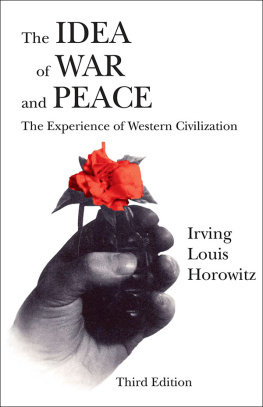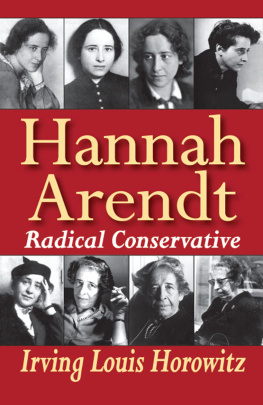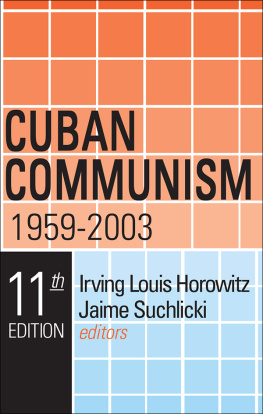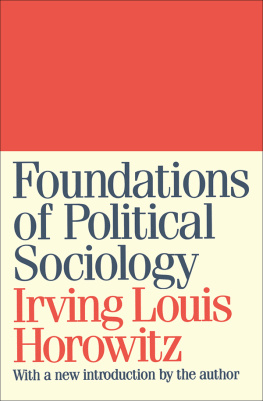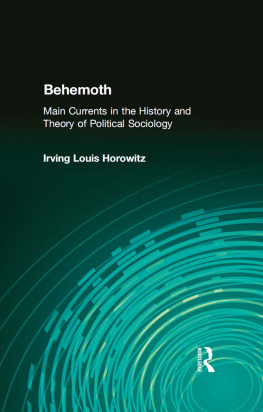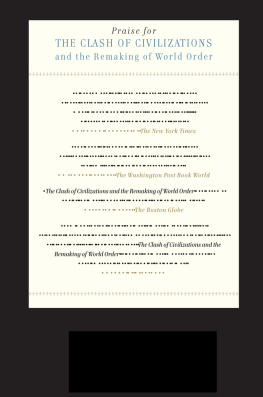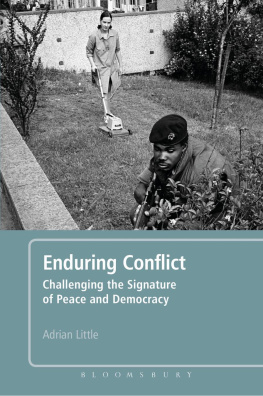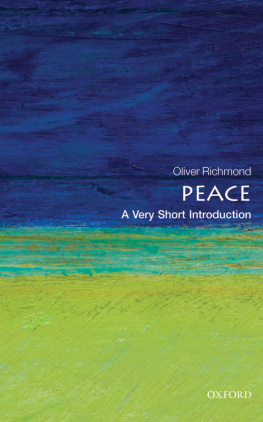First published 2007 by Transaction Publishers
Published 2017 by Routledge
2 Park Square, Milton Park, Abingdon, Oxon OX14 4RN
711 Third Avenue, New York, NY 10017, USA
Routledge is an imprint of the Taylor & Francis Group, an informa business
Copyright 2007 by Taylor & Francis.
All rights reserved. No part of this book may be reprinted or reproduced or utilised in any form or by any electronic, mechanical, or other means, now known or hereafter invented, including photocopying and recording, or in any information storage or retrieval system, without permission in writing from the publishers.
Notice:
Product or corporate names may be trademarks or registered trademarks, and are used only for identification and explanation without intent to infringe.
Library of Congress Catalog Number: 2006051115
Library of Congress Cataloging-in-Publication Data
Horowitz, Irving Louis.
The idea of war and peace : the experience of Western civilization / Irving Louis Horowitz.3rd ed.
p. cm.
Rev. ed. of: War and peace in contemporary social and philosphical theory. 2nd ed. 1973.
Includes bibliographical references and index.
ISBN 1-4128-0633-X (alk. paper)
1. Peace (Philosophy)History20th century. I. Horowitz, Irving Louis. War and peace in contemporary social and philosophical theory. II. Title.
JZ5560.H72 2007
172 .42dc22
2006051115
ISBN 13: 978-1-4128-0633-6 (pbk)
This is actually the third edition of The Idea of War and Peace. Each time the book appeared it was under different circumstances, even different titles, but each publication represented a personal triumph over adversity. The body of the text has remained unchanged in each edition. Whatever my private sentiments may be to justify re-publishing this work is another matter one in which I am ill equipped to determine, since like any author I am filled with more than my fair share of vanities. But I would wish to briefly note aspects of each edition that, in addition to my personal reasons strike me as being consequential in the widely shared development of a social science standpoint and also a normative theory of international relations.
This third appearance of The Idea of War and Peace comes at a time when my work in the general area of war and peace studies has come to be appreciated, if not readily accepted. The key to my analysis a half century ago and now is my firm belief that nothing is more absurd or futile than to dissociate research on war from so-called peace studies. Like nationalism and internationalism war and peace are locked into each other throughout the history of the human race. They are, if you will, the social expression of human hate and love. We are not dealing here with desires but with observed realities. Nearly everyone desires long life and good health, but just about all people must grapple with the inevitability of the termination of life and at least some periods of poor health before the end comes. So it is with war and peace research; we want the latter but must grudgingly live with the former.
The entire field of peace studies is predicated on sentiments one can admire while dismissing its possibilities as a stand-alone discipline. Such sentiments are not unlike the views of those who wish to bring about a fine environment free of global warming and cooling, or liberated from a variety of carcinogens that pollutes the atmosphere. We want peace, but we study war. We want constructive answers, but we engage in destructive behavior. To deny such obvious premises is simply to fall prey to moral judgments about the pleasures of consensus and the pains of conflict without a remote appreciation of how they relate to each other. The dialectical scheme of human nature, called society, must put aside the idea that either the anarch or the behemoth can long survive without the other. For the most part, as an optimum outcome, we live in the public space between war and peace, much as we live our private lives between love and hate.
There are moments of grandeur and tranquility, and these are followed by longer periods (not moments, alas) of degradation and disquietude. A wide range of events in the world and emotions in the heart has long been understood by classical philosophy and given added dimension by modern social science. To admit the obvious is not to negate the better emotions nor separate ourselves from baser emotions. It is to recognize that between our sense of the world and our sensibilities about what we want from the world are nothing short of the history of humane letters as such. That was at the root of my thinking in 1955, and it remains the case in 2007. This half-century has demonstrated that human beings can construct agencies dedicated to world peace, but they also pollute such agencies into instruments for further strife racial, religious, national, ethnic, you name it.
This is a shorthand way of noting that moral changes are slow in coming. The original edition contained essays on fine scholars who represented some of the more enduring efforts to move beyond the dialectical pessimism of war and peace into something just a trifle more compelling in ethical terms. Despite their efforts, we have the huge development of weapons of mass destruction, topped off by nuclear weapons that are developed with increasing sophistication in potential for damage and ease of delivery. That said technology has arguably served as a constraint on world conflagration in the past half-century. After all, nuclear tests may have occurred with regularity, but the widespread use of nuclear weapons did not necessarily follow. The same condition obtained with chemical and biological weapons they were fully developed, but rarely used. So again, the evolution of the subject at hand, The Idea of War and Peace, is not something for which we need to throw up our hands in despair, any more than we have the authority to raise our glasses and toast the coming of a new age of pacification.
The figures discussed in this volume were chosen in good measure because they all began, either implicitly or explicitly, from the premises stated above. They wrestled with the devil of war and worshipped the god of peace but they knew full well that the two giant concepts, like the world itself, were locked in mortal combat. It is as Goethe well understood in Faust: ours is a world of struggle between the good and good, or more prosaically, between contested notions of good. Conflicts between good and evil, or what is commonly understood as such, are far easier and less subject to serious analysis. From the very outset, and to the dismay of not a few of my elders who read the book at the time this volume strove to establish the grounds for survival one day, one year, one century, one millennium at a time. Whether through the follies of a few humans or the laws of entropy, this world will end as a catastrophe or a cataclysmic moment, the way it began, is not the subject of this work. Neither the lunacy of the few who rule, nor the rationality of nature itself, is the subject of this book. Rather it is rooted in something immodest yet grandiose enough: the survival and growth of the human species for a finite period of time in a special place of space called Earth.

